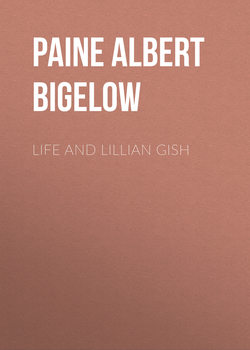Читать книгу Life and Lillian Gish - Paine Albert Bigelow - Страница 11
PART ONE
VIII
“DOWN THE LINE”
ОглавлениеWith money saved from her own and the children’s earnings, Mary Gish opened a candy and popcorn stand at the Fort George amusement grounds. Her six or seven years of candy making and business experience came in very handy, now. She hired an assistant—one strong enough to pull the taffy she made—Don, a handsome, good-hearted boy, with whom Dorothy fell desperately in love. It was a joy to Dorothy to stand on the counter or on a chair and “ballyhoo” for Don’s taffy and popcorn. “This way for the best taffy and popcorn in New York! This way, this way!” Lillian would do it, too, but from a sense of duty, and much less riotously. Mary Pickford recently said:
“I can still hear Lillian’s timid little voice saying: ‘Would you like to buy some popcorn?!’”
To the Smith (Pickford) family, Mrs. Gish’s stand at Fort George was in the nature of a diversion. Often in high season, they went up there, to help. In the early morning, the two families rode up together on the streetcar, the two younger ones discussing their rights to the “outside seat.” Jack was dead in love with Dorothy, but there is a limit to love’s sacrifice.
Arriving at Fort George, everybody helped. The corn had to be popped and put in bags; the candy had to be wrapped in paraffined paper, a good deal of a chore. Mrs. Gish let them eat what candy they wanted, and in the beginning their by-word was “Wrap one and eat two.” Then presently they were just wrapping, for the charm of a candy diet is fleeting. There was a place “down the line” where one got marvelous German-fried-potatoes, at a nickel a dish. About noon, armed with a nickel apiece, they went down there. Those heavenly fried potatoes! If one might only get a job with the potato man. Or the milk-shake man....
An interesting place, the “line”: Stands of several sorts; a variety of shows, and a merry-go-round. The children found it fascinating. There was a place where they had ponies, and the man there on slack days let Lillian and Dorothy ride. They learned quickly, and went tearing up and down, their astonishing hair flying out behind. They really rode like mad—good training for those “picture” days ahead, when as Indians, or cowboys, they would go racing among the hills behind Los Angeles. The pony man declared that they rode like monkeys, and the lovely spectacle they made undoubtedly brought him business.
Dorothy came to grief. One day her pony swerved, or stopped, or something, and Dorothy didn’t. So she broke her arm, a thing so terrifying to Lillian that she scrambled quickly from her horse and hid behind the merry-go-round. The alarm reached the Gish taffy stand, and Dorothy’s beloved Don came on a dead run and bore her in his arms to her mother. Don, so noble and brave and beautiful—how heavenly—worth breaking one’s arm for. Then there was the ride to the hospital in the clanging ambulance, with everybody getting out of the way!
Nobody seems to have thought of Lillian; yet she needed comfort almost as much as Dorothy. Often she fainted at the sight of suffering. If anything was to be done that meant physical pain, like the drawing of a tooth, she was promptly sent from the room. Even then, the knowledge of the fact was almost too much for her.
She was more self-contained than Dorothy, who would do almost anything on the spur of the moment. One day at the apartment, two girls came along below the window, where Lillian and Dorothy looked out.
“Come down to us,” one of the girls called, holding out her arms—“Jump!”
And though the distance was several feet, Dorothy was ready to do that—the girl who called was so beautiful. Her name was Evelyn Nesbit.
There was not much time for cooking in the Gish flat, and anyway the weather was hot—too hot to bend over the kitchen stove after a day on the “line.” The younger members, the five of them, would go out foraging for cool things.
We used to love to buy our dinner in the delicatessen shops [Mary Pickford writes]. The five of us would troop in and order pickles and turkey to take home.
One can imagine that little row of future stars ranged along the fat delicatessen man’s showcase, coveting all the good things in it, agreeing at last on a modest purchase of pickles and turkey. Any one of them could have eaten every bit of it. Sometimes they extended themselves on a bit of dessert—ice-cream, always—who does not love ice-cream? They had an ice-cream complex. If they were in funds, they bought a little dab to take home, and had their own dessert in advance—ice-cream soda. The Greeks over there sold ice-cream soda for five cents. When, one day, they raised it to ten, it was the end of the world.
